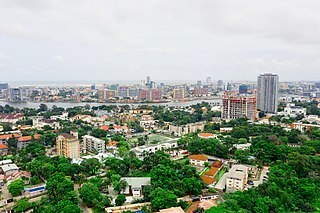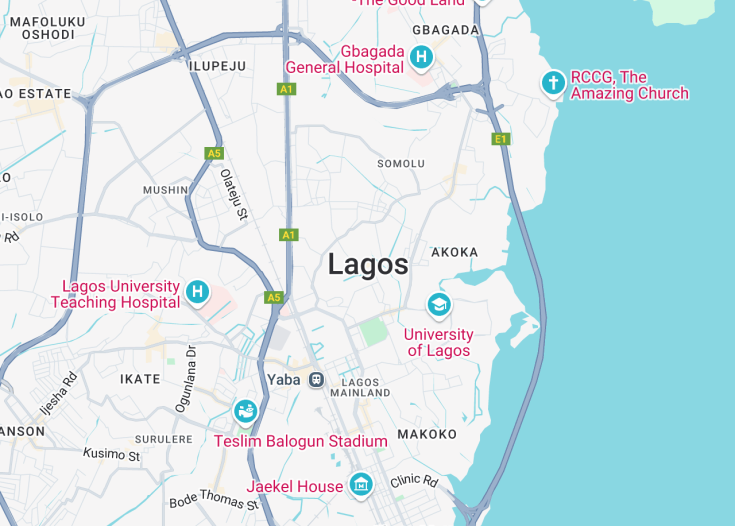Lagos, Nigeria’s largest city, vibrates with energy and ambition, creating a dynamic atmosphere unlike any other on the continent. Known for its diverse cultural offerings, bustling markets, vibrant nightlife, and extensive lagoon waterfronts, Lagos is a sprawling metropolis that offers an array of experiences. The city’s historical significance is highlighted by its colonial architecture, while its modern developments underscore its role as a leading economic hub in Africa. Lagos provides a unique opportunity to explore an eclectic mix of traditional and contemporary attractions.
Remember to visit the Lekki Conservation Centre, a nature preserve offering serene landscapes and wildlife sightings, ideal for a day away from the urban bustle.
Plan your visit during the cooler months from July to September to avoid the city’s challenging humid temperatures.
Top things to do & see in Lagos
Select the following sights and activities to discover best tickets and tours available in Lagos.
Lagos: Vibrant Heart of Nigeria
| Country | Nigeria |
| Time in Lagos | GMT+1 |
| Language spoken | English (Official) |
| Population | 14.8 million (World Population Review, 2023) |
| Currency | Nigerian Naira (₦, NGN) |
| Airports |
|
Lagos, the largest city in Nigeria and one of the fastest growing cities in the world, is a beacon of cultural and economic might. Its significance in Nigeria—both as a financial center and as a hub of entertainment and arts—cannot be overstated. Historically, Lagos served as the capital of Nigeria until 1991, and it continues to hold a vast amount of the nation’s commercial activities within its borders. The city’s vibrant, multicultural environment culminates from its rich history of trade and diverse ethnic backgrounds, making it a pivotal area in the socio-economic development of Nigeria. Located on the Gulf of Guinea, Lagos has evolved from a small fishing village into a sprawling metropolis, reputed to be one of the most populous urban agglomerations in Africa. The city’s architecture is a blend of modern high-rises and traditional Nigerian styles that provide a visual narrative of its rapid growth and mixed influences over the decades. A major attraction in Lagos is its thriving arts scene, notably the National Arts Theatre as well as numerous galleries and spaces that showcase an array of African art, music, and folklore. Lagos also hosts numerous festivals and social events which continuously draw tourists and reinforce the city’s status as a cultural hub. Despite its appeal, Lagos is also known for its substantial economic disparity, with wealth being juxtaposed against vast areas of poverty, and luxury high-rises overlooking makeshift slum areas. Yet, its economic prowess continues to grow, manifested in its bustling markets, large scale industries, and as a nexus for international trade. Furthermore, Lagos’s status as a center for the Nollywood film industry adds a layer of cultural significance. It is a place where traditional Nigerian culture and modernity coalesce to create unrivaled dynamism seen throughout the city’s day-to-day life. Anyone serious about understanding Nigeria’s essence must witness Lagos — a city that perfectly encapsulates the complexity and charisma of modern Nigeria.
Where is Lagos?
Situated in the southwestern part of Nigeria, Lagos extends along the Atlantic coast and into the Lagos Lagoon.
Distances:
| Route | Distance by car | Time by car |
|---|---|---|
| Abuja to Lagos | 760 km | 10 hours |
| Ibadan to Lagos | 135 km | 2 hours |
| Benin City to Lagos | 320 km | 4 hours 30 mins |
What is Lagos famous for?
Lagos is renowned for its vibrant music scene, dynamic cultural festivals, bustling markets, and as the heart of Nigeria’s Nollywood film industry.
History
The history of Lagos, Nigeria, is a fascinating journey through time, marked by diverse influences and pivotal events that have shaped its current character.
Before 1400s: Early Inhabitants
The area now called Lagos has been inhabited by the Awori subgroup of the Yoruba people. Fishing and salt production were the main activities due to the region’s proximity to the Atlantic Ocean. Even then, Lagos, known as Oko to its indigenous people, was recognized for its strategic coastal position.
1472 – Arrival of the Portuguese
The history of Lagos took a dramatic turn when Portuguese explorers led by Rui de Sequeira visited the area in 1472, naming it Lago de Curamo, which eventually became Lagos. The introduction of European trade altered the social and economic landscape of Lagos, paving the way for it to become a significant regional trading post.
1600s – 1800s: Colonial and Slave Trade Era
Lagos saw its role expanded as a major centre for the slave trade under the control of various European powers. In 1861, British colonial expansion led to the annexation of Lagos, turning it into a Crown Colony. This period marked a significant transformation in its infrastructure and administrative systems.
1900s: Growth and Independence
By the 20th century, Lagos had evolved into a bustling metropolis. It became Nigeria’s capital upon independence in 1960, a status it held until 1991, when Abuja became the national capital. Post-independence, Lagos experienced rapid economic growth and urbanization, reinforcing its position as an economic powerhouse within Nigeria.
2000s to Present: Modern Developments
In recent decades, Lagos has continued to expand economically and demographically. It is now the most populous city in Nigeria and a major financial centre in Africa. Modern infrastructure projects and cultural developments have helped maintain Lagos’s status as a vibrant hub of commerce, culture, and innovation.
Visit Lagos
What to see and do in Lagos, Nigeria
Explore the vibrant city of Lagos, a bustling metropolis rich in culture and history. Key attractions include:
- The Nike Art Gallery, showcasing a vast collection of Nigerian arts and crafts.
- Lekki Conservation Centre, a nature reserve ideal for relaxation and wildlife viewing.
- The historic Freedom Park, located on the site of the former colonial prison, now a venue for concerts and cultural events.
- Tarkwa Bay Beach, accessible by boat and perfect for a tranquil escape from the city hustle.
- Explore the bustling markets such as Balogun for an authentic shopping experience.
Events in Lagos
Lagos hosts a variety of events throughout the year. Notable events include:
- The Lagos Jazz Series, a festival of international and local jazz acts usually held in November.
- Eko International Film Festival, attracting global filmmakers, typically in March.
- The Lagos Seafood Fest, a celebration of seafood cuisine taking place in late September.
Best time to visit Lagos
The best time to visit Lagos is during the dry season from November to January when the weather is cooler and more pleasant. This period avoids the heavy rains from April to July and the extreme heat in February and March.
Is Lagos worth visiting?
Lagos offers a unique blend of traditional and modern experiences making it a worthwhile destination. With its rich history, vibrant cultural scene, and bustling markets, there is always something to discover. However, potential visitors should note the challenges such as occasional traffic congestions and higher urban density. Moreover, some may find the climate quite hot and humid. Despite these factors, the city’s dynamic nature and warm hospitality indeed make it a captivating destination to explore.










